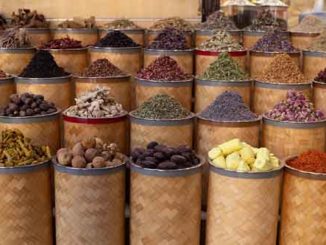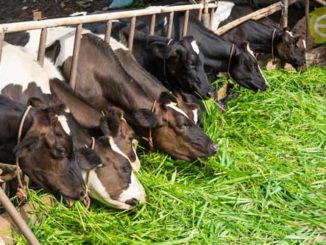Milk producing animals have four stomachs, the first stomach having a capacity of 50—60 litres, where the straws, feeds and fodders are fermented, is called rumen. Rumen has very large number of bacterial population, which digests these straws and grasses. However, when we are feeding cakes and protein meals to these animals, major part of the proteins (60—70%) is broken down to ammonia by the rumen microbes, and most part of this ammonia is converted to urea in liver and excreted through urine. A significant part of protein meals, which is the most expensive part of the animals’ diet, is thus wasted.
However, if we give suitable chemical treatment to these protein meals then the rumen microbes are not able to break down these protein meals, and these are digested and utilized more efficiently for milk production in lower part of the digestive system. The technology is termed as bypass protein technology. The bypass protein supplement provides essential amino acids, to be available for absorption at the small intestine. Protecting protein meals from degradation in the rumen, but allowing them to be digested in the lower part of the gastro-intestinal tract by optimally protecting them, can ensure a better balance of nutrients, absorbed and utilized, resulting in a substantial improvement in productivity.
HOW BYPASS PROTEIN SUPPLEMENTS ARE PRODUCED
Regionally available protein meals, like rapeseed meal, groundnut meal, sunflower meal, guar meal, soybean meal, cottonseed meal etc., are treated suitably, so as to reduce degradability of the proteins in the rumen from 60-70% to 25—30%, in a specially designed airtight plant. Protein meal identified for treatment is first ground to 3 mm particle size, treated chemically at appropriate level and then stored for 9 days under airtight conditions. After 9 days of incubation, protein meal is ready for feeding to animals and it can be even stored for more than a year, without any deterioration in quality. Treatment does not at all affect color, flavor or taste of protein meal/cake.
HOW TO FEED BYPASS PROTEIN SUPPLEMENT AND ECONOMIC BENEFITS
Treated protein meals can be either fed directly to animals as top feed @ one kg per animal per day or else, treated meals can be incorporated in cattle feed @ 25 per cent and this feed (bypass protein feed) can be fed @ 4-5 kg per animal per day, depending up on the level of milk production. As cost of treatment of cakes/meals ranges from 70 to 80 paise per kg, in all, a farmer is to spend 70 to 80 paise extra if he feeds daily either one kg bypass protein supplement or 4-5 kg bypass protein feed, containing 25% treated protein meals. SNF content of milk can be increased with bypass protein supplement.
|
SUMMARY OF FEEDING TRIALS ON BYPASS PROTEIN AS TOP FEED |
|||||
|
Feeding trial with treated meal |
Farm location | Increase in comparison to control | |||
| Milk
(Lt.) |
Fat
(%) |
Protein
(%) |
Net income (Rs./ani./day)
|
||
| Sunflower meal in cows | Sarsa |
1.00 |
0.30 | 0.20 |
9.85 |
| Rapeseed meal in cows | Ravipura |
1.10 |
0.20 | 0.20 |
9.61 |
| Rapeseed meal in cows | Sarsa |
0.90 |
0.30 | 0.10 |
9.25 |
| Guar meal in cows | Ravipura |
0.90 |
0.20 | 0.20 |
8.60 |
| Sunflower meal in buffaloes | Chikhodra |
0.80 |
0.40 | 0.30 |
14.49 |
| Rapeseed meal in low yielding cows | Sarsa |
0.70 |
0.20 | 0.20 |
5.88 |
ECONOMICS OF FEEDING BYPASS PROTEIN FEED AT FARMERS’ LEVEL
A survey conducted in Vadodara district of Gujarat revealed that, on feeding bypass protein feed average increase in net daily income was Rs 9.20, 6.42 and 12.41 in indigenous, crossbreds and buffaloes, respectively. It is important to remember that for maximum economic returns, over feeding should be avoided. In case of crossbreds, there was maximum increase in milk production, however, net daily gain was lower as the level of feeding was higher than the recommended level.
SAFETY ASPECTS
As bypass protein supplement is produced in a specially designed airtight plant, there is no risk to workers operating bypass protein plant. Moreover, workers on the plant are advised to wear gloves, masks and safety glasses. Meter is provided at the plant, which produces beep—beep like sound if there is any leakage in the plant and level of chemical increases beyond 2 ppm, a very-very safe limit. Chemical used for treatment of protein meals is at very-very low levels and it poses no health risk to animals. It is not excreted in milk and no residues of chemical are found in meat of beef animals, as evidenced by several scientific studies, world over. Even use of treated meals has been declared to be safe by the US—FDA, in the ration of beef and milk producing animals.
ADVANTAGES OF FEEDING BYPASS PROTEIN SUPPLEMENT
- Cheaper source of protein for animals.
- Increases availability of essential amino acids.
- Improvement in milk production.
- Easier to meet the requirement of high yielding animals.
- Improvement in fat and SNF per cent.
- Helps in increasing net daily income.
- Better growth in young animals.
- Improved reproduction efficiency.
- Better resistance against diseases.
- Helps to control salmonella and reduce mould growth when used with cattle feed.
Source: National dairy development board, Anand






2 Trackbacks / Pingbacks